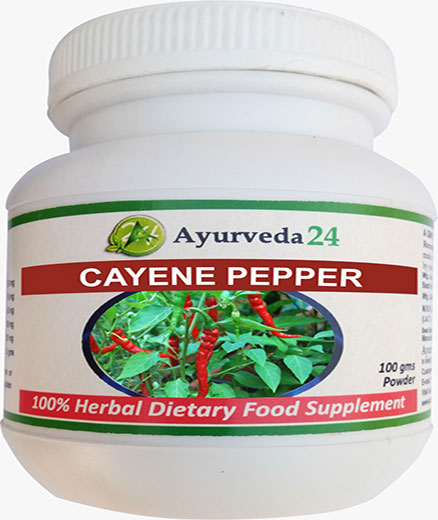Description
Botanical Name – Capsicum annum
English Name – Cayenne Pepper
Sanskrit Name- Katuveera, Pittakarini
Hindi Name – Lal mirchi
Cayenne Pepper, commonly called “LalMirchi”, belongs to the Capsicum family. It is a small biennial or annual shrub, grows up to 10-25 cm in length. It grows in tropical temperate zones. The most favorable climatic conditions for its cultivation are warm atmosphere and warm, moist soil rich in nutrients. It takes approximately 100 days to mature and be edible.
Cayenne pepper is used extensively to enhance the flavor of savory dishes and chemical components and nutrients present in it provide health benefits too.
Energetics of Cayenne Pepper
According to Ayurveda
Rasa (Taste): Katu (Pungent)
Guna (Qualities): Laghu (Light), Rooksha (Dry), Teekshana (Strong, Piercing)
Vipaka (Taste conversion after digestion): Katu (Pungent)
Veerya (Potency): Ushna (Hot)
Effect on Tridosha– It reduces vitiated Kapha and Vata doshas and increases Pitta dosha.
Parts used –Fruits and seeds
Chemical Constituents
Cayenne pepper contains up to 1.5% capsaicinoids (pungent principles) including 0.11% capsaicin, nordihydrocapsaicin, homodihydrocapsaicin, 6,7-dihydrocapsaicin and homocapsaicin; fixed oils; carotenoid pigments including capsanthin, capsorubin, alpha- and beta-carotene, steroid glycosides, including capsicosides, vitamins C and A; traces of volatile oil.
It has rich vitamin components like vitamin E, C, K, B complex and carotenoids. It also contains other minerals and fibers.
Role
- Analgesic
- Antifungal
- Anti-inflammatory
- Antimicrobial
- Antioxidant
- Carminative
- Digestive
- Diaphoretic
- Immunomodulator
- Stimulant
Benefits
Digestion
- Research suggests that cayenne pepper stimulates salivary glands and the flow of enzyme production which is essential for digestive system to work properly.
- According to Ayurveda, it increases the secretion of hydrochloric acid that helps digest food.
- It also stimulates gastric juices that aid the body’s ability to metabolize food and toxins.
- The ‘capsaicin’ in cayenne pepper may help prevent ulcers as it kills bacteria and stimulates the stomach lining to secrete protective buffering juices that prevent ulcers.
- Cayenne is also shown to improve the elimination of waste products.
- Provide relief in upset stomach, gas, cramps, indigestion and diarrhea.
- Normalize glucose levels.
- It is also useful for people with difficulty in swallowing.
- It suppresses appetite, burns excess fat and boosts metabolism thus aids in weight loss.
- Cayenne pepper soothes the inflammation and bloating resulting from allergies, food sensitivities and infections.
Respiratory System
- Cayenne pepper stimulates the secretions that help clear mucus from blocked nose or congested lungs.
- Helps relieve congestion and stuffiness.
- If congestion is due to cold or sinus, it helps by clearing up the sinuses.
- It heals the respiratory symptoms of Asthma.
- Fights Cold and Flu
- It also raises body temperature, which leads to sweating and increases the activity of your immune system.
Heart Care
- Improves blood circulation
- It reduces the cholesterol formation and dissolves fibrin (the principal constituent of blood clots).
- In case of constricted blood flow or clots, cayenne pepper encourages fibrinolytic activity and may help dissolve the clot thus improving the blood flow.
- Studies suggest that the ‘capsaicin’ in cayenne pepper helps to clear away artery-narrowing lipid deposits, dilates arteries and blood vessels to clear blood clots.
- It maintains normal blood pressure levels and helps the body lower LDL cholesterol and triglycerides and reduces platelet aggregation.
- It also maintains that nutritional flow through blood is smooth and the blood wastes are removed effectively.
- Cayenne is a cardiac stimulant, boosts heart functions and is effective in preventing heart attacks.
May Act as Anti-Cancer Agent
- According to some studies, ‘capsaicin’ may act as natural remedy for cancer, including in the management of prostate cancer.
- Other researchers suggest that ‘capsaicin’ may help to inhibit the growth of cancer cells and prevent the activation of new dangerous formations.
- It may be effective in preventing lung cancer in smokers. High amounts of capsaicin in Cayenne pepper can stop the formation of tobacco induced tumors in the lung.
Rheumatic pain or Arthritis
Owing to its anti-inflammatory properties, cayenne pepper has calming effect on the affected area. It distracts the pain causing nerves from the inflamed and painful joints. It reduces redness, pain and swelling.
Boosts Immunity
Cayenne has great antioxidant properties thus play major role in improving the immunity of the body against infections and pathogens.
Prevents Allergies
Cayenne, an anti-inflammatory agent, has the power to prevent allergies and the associated symptoms.
Other Uses
- Relieves Migraine Pain, headache
- Helps in detoxification – It stimulates circulation and eliminate acidity.
- As per some studies, cayenne pepper relieves pain after surgery, such as a mastectomy or an amputation.
- It also provides relief in pain from nerve damage in the feet or legs from diabetes, lower back injuries, neuropathy and fibromyalgia symptoms like joint or muscle pain.
- Works as Anti-Irritant – it is effective in easing ulcers, upset stomach, cough and stop diarrhea.
- May help treat Psoriasis – significant decrease in scaling, thickness, redness and itching.
- Source of Vitamin A – helps in maintaining healthy vision, neurological function and healthy skin
- Contains Vitamin E – helps many organs in the body to function properly. It is useful in naturally slowing the aging process.
- Due to its anti-fungal properties it kills fungus and prevents the formation of fungal pathogens.
- It can relieve toothache, seasickness, alcoholism, malaria and fever.
- It is also extensively used in energy drinks.

